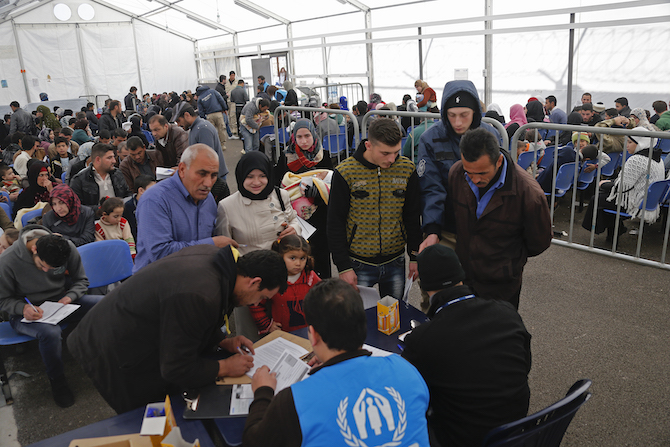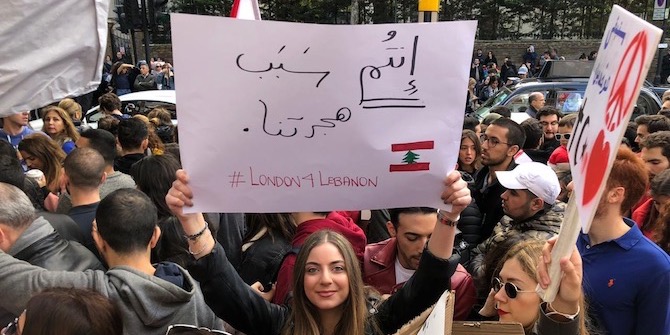by Youmna Cham & Mona Salem

The new coronavirus pandemic continues to spread across the world, raising alarm for refugees and Internally Displaced Persons (IDPs) who are already devastated by acute and ongoing conflicts. The United Nations High Commissioner for Refugees (UNHCR) stated that of over 100 countries affected by COVID-19, 34 host refugee populations exceeding 20,000 people.
At least 12 million refugees and IDPs live between Lebanon, Turkey, Jordan, Syria and Iraq. All these countries have close ties or territorial borders with Iran, the third most severely hit country by the virus after China and Italy.
Refugee camps across the Middle East are facing the threat of severe outbreaks of the virus. Although no cases have yet been found, there are growing concerns about how ill-prepared these camps are in the face of the virus and its deadly contagion.
Refugee populations are certainly more vulnerable to such diseases and plagues. Global attention to the challenges posed by this virus has focused little on low- and middle-income countries, while the refugee populations are largely ignored. This is why a global approach is urgently needed to avoid a tragic death toll amongst the most vulnerable.
Underlying Vulnerability
Refugee settlements, often referred to as “humanitarian Silos”, have dense concentrations of population within small areas and, as such, they are much exposed to virus outbreaks. Further, the ability of coronavirus to permeate a population is mainly dependent on two factors: quality of water and level of sanitation, both of which are in short supply in refugee camps. Therefore, overcrowded camps, poor access to WASH (water, sanitation and hygiene) facilities, and especially poor access to basic healthcare are key factors that make them more susceptible to the pandemic.
In Syria’s northwest, where thousands live in crowded camps, medics and aid workers have warned that these sites would be unable to cope with an outbreak. The health care system is non-functional due to the bloody conflict, and civilians have weak immune systems from being exposed to years of violence, poverty and malnutrition.
Meanwhile, Turkey continues to host the largest number of refugees worldwide. Recently, it started taking measures to stem the coronavirus outbreak after the total number of cases rose to 191. Turkey’s ambassador to the United States has furthermore declared that the country will not be able to stop the spread of coronavirus in Syrian refugee camps.
Lebanon’s case is much more complicated – as of Thursday 19 March, the total number of Coronavirus cases has risen to 149. Lebanon hosts the largest number of Syrian refugees per capita (about 1.5 million), along with 18,500 refugees from Iraq, Sudan and other countries, as well as 200,000 Palestinian refugees that fall under UNRWA’s mandate. In line with the government’s policy of not establishing formal refugee camps, some of the formally registered Syrian refugees are currently living in cities, villages or hastily-erected tented settlements throughout the country. The no-camp policy adopted by the Lebanese government may indeed hamper the effective confinement of COVID-19 amongst refugees. This is also coupled with the fact that Lebanon has an inefficient and weak health system to contain and monitor emergency responses.
What needs to be done
Most refugees are now moving into urban areas to avoid the squalid conditions and limited prospects offered in camps. Urbanisation has changed the landscapes refugees find themselves in, and cities like Istanbul, Beirut and Amman have become alternative choices to life in camps. To take the example of Syrian refugees, only 8 percent live in camps.
Although UNHCR has developed an Urban Refugee Policy to cope with the growing trend of refugees moving to cities, in practice it offers very little tangible help to urban refugees.
With a broken refugee system, the international community needs to take immediate and strategic actions to prevent and address the spread of the disease amongst the refugee population before reaching the doorstep of a new humanitarian catastrophe.
The role of humanitarian agencies is crucial in this time to boost the preparedness, prevention, early detection and response to the virus, especially in fragile host countries. An effective strategy would be to start implementing an adequate surveillance/early warning system that could detect initial/suspected cases and clusters, and to start training aid workers – especially locals – to investigate outbreaks and manage ill populations. Another way of containing COVID-19 transmission would entail the provision of adequate sanitation and consistent campaigns to raise awareness about hygiene and preventive precautions.
Host countries in the Middle East, especially Lebanon, have public health systems too fragile to be left to act alone; the international community needs to take decisive precautionary measures and assist them in preventing a potential outbreak of the virus amongst refugees.
This pandemic is pushing us to self-quarantine, and thus is also affecting the market, our social relations and our routine. One hopes that this might incite reflection upon the structure of our political systems and the interdependency we have as human beings regardless of social status, race, class, gender or ethnicity.







Tripoli is the capital of Libya, not Lebanon, written at the start of this article. Especially because both of authors are from Beirut.
Please correct that.